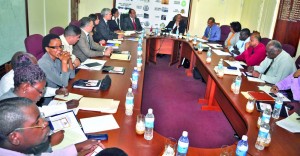By Janelle Persaud

Amidst growing concerns about lax border security between Guyana and Venezuela, the two countries on February 10th met in Guyana to draw up a new anti- drug trafficking strategy which will ensure real-time cooperation and the forfeiture of the assets of those convicted of smuggling.
At the opening ceremony of the one-day meeting, Home Affairs Minister Clement Rohee said a new deal should ensure real-time cooperation between the respective law enforcement agencies of the two countries. According to the minister, the agreement should also include assistance in taking necessary actions to confiscate the assets of those convicted of involvement in the illegal drugs trade or related offences.
He told the participating delegates that their discussions come at an opportune time when Guyana is on the verge of creating a successor to the National Drug Strategy Master Plan.
“A key component of any antinarcotics strategy must be cooperation and coordination with Guyana’s neighbours, especially in view of the fact that much of the drug activities associated with Guyana have their origins beyond Guyana’s boundaries,” he added.
The minister further stated that efforts to address the drug problem cannot be just the purview of national governments but demand “regional and international cooperative and coordinated action”.
Rohee has acknowledged the difficulty of securing the 672 kilometre-long border with Venezuela, noting that it would be a difficult task for even a developed country with the appropriate resources.
The revision of the 1987 anti-narco-trafficking agreement was raised when President Bharrat Jagdeo met his Venezuelan counterpart Hugo Chavez in Caracas last July. They concurred that efforts must be made to intensify cooperation between the law enforcement agencies of both countries.
Meanwhile, speaking on the implementation of the National Drug Strategy Master Plan 2005-2009, Rohee refuted claims that it only exists on paper, noting that many of the recommendations have been implemented. “Of the 36 programmes identified for implementation under that strategy, 17 have been concluded, 16 are works in progress and three – I repeat three – have not commenced implementation,” he outlined.
The minister informed the participants that those programmes were not implemented only as a result of resource limitations. These programmes, he assured, will be rolled over to the new plan being developed once deemed relevant.
The home affairs minister also referred to the successes that Guyana has had over recent years in its antidrug trafficking efforts. The seizure of cannabis amounted to 191,877kg, in 2010, while 537 persons were arrested and charged for offences related to the possession/trafficking of cannabis, Rohee revealed.
The seizure of cocaine in 2010 amounted to 71.825kg; while 132 persons were arrested and charged for offences related to the possession/trafficking of cocaine, he added.
According to him, eradication exercises were conducted on 61 cannabis fields, which totalled 97 acres, with plants weighing approximately 185,221 kg.
This year, local authorities are seeking to advance their work by providing more human and technological resources to Customs AntiNarcotics Unit and the narcotics branch of the Guyana Police Force.
They will also enhance the presence of these two departments at all legal and illegal entry and exit ports; enhance maritime intelligence by establishing relevant databases and profiling of vessels and use advanced technology to conduct effective raids and searches.
Rohee disclosed that the administration will also continue to upgrade security arrangements at the Cheddi Jagan International Airport and Ogle International Airport to stem the flow of drugs out of the country, and ensure accountability and transparency in the activities of law enforcement ranks through regular polygraph testing.
Leading the Venezuelan delegation was that country’s ambassador to Guyana, Dario Morandy, who in brief remarks before official talks began said Venezuela is satisfied with the work that is being undertaken in Guyana as it relates to revision of the anti-narco-trafficking agreement. According to him, it represents ongoing work that started some time ago, which he believes will foster regional integration. “We hope that this agreement will become an instrument to define programmes and implement institutional policies to reduce the consumption, trafficking and production of narcotics drugs and psychotropic substances, as well as related offences such as money laundering,” Morandy expressed.
Other officials who made up the Guyanese delegation were Director General Elizabeth Harper, Crime Chief Seelall Persaud and other high-profile security officials, including former Police Commissioner Floyd Mac Donald and former army boss Michael Atherly.



